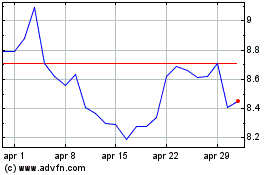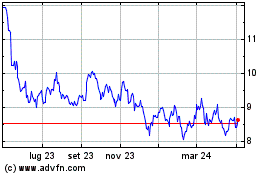U.K. to Ban Huawei From Its 5G Network -- 2nd Update
14 Luglio 2020 - 4:12PM
Dow Jones News
By Stephen Fidler and Max Colchester
LONDON -- The British government said it would bar telecom
companies from purchasing new equipment made by China's Huawei
Technologies Co. and gave them until 2027 to remove its technology
from their 5G networks, a sharp about-face that marks a significant
victory for the U.S.
The decision follows new U.S. restrictions on Huawei computer
chips and comes amid a broader deterioration of relations between
the U.K. and China, most recently relating to China's imposition of
a new security law over the former British colony of Hong Kong.
Oliver Dowden, the British minister in charge of digital issues,
told the House of Commons on Tuesday that new purchases of Huawei
5G equipment would be barred starting the end of this year and that
the Chinese company's gear would have to be stripped out of British
networks by the end of 2027. As recently as January, the U.K. said
it could mitigate the risk of Huawei equipment in its networks.
The U.K is also launching a consultation on when to ban the
purchase of Huawei equipment for the country's fiber-optic network.
This will be followed by a transition period that isn't expected to
exceed two years.
The move comes as U.S. pressure builds on European governments
to shut Huawei out of their 5G networks. Senior U.S. officials, led
by U.S. national security adviser Robert O'Brien and his
counterparts from Italy, Germany, France and the U.K. are meeting
in Paris this week.
The Trump administration ratcheted up its pressure on Huawei in
May with restrictions that stop foreign semiconductor manufacturers
whose operations use U.S. software and technology from shipping
chips to Huawei without first getting a license from U.S.
officials. British officials said this restriction raised questions
about the quality of Huawei equipment in the future.
U.S. officials have long said Beijing could direct Huawei to
sabotage or spy through 5G networks, which promise to provide
superfast wireless speeds for coming technologies such as
self-driving cars. Huawei and the Chinese government reject the
charges.
Mr. Dowden said the move, which would be written into law in the
fall, would delay the development of 5G by two to three years and
cost up to GBP2 billion ($2.5 billion). He said the U.S. measure
was "a significant material change" in the risk associated with
using Huawei technology. The sector suffered from "a global market
failure," he said, and was "dangerously reliant on too few
vendors."
The U-turn followed a new review by the U.K.'s National Cyber
Security Centre, part of the nation's GCHQ electronic-intelligence
agency, triggered by the U.S. export ban in May. The swift policy
reversal played out during the coronavirus pandemic.
Ed Brewster, a spokesman for Huawei UK, said the decision
"threatens to move Britain into the digital slow lane." Urging the
government to reconsider, he said the new U.S restrictions wouldn't
have affected the security of the products supplied to the UK.
Mr. Brewster said Huawei, whose equipment will remain in 2G, 3G
and 4G networks in the U.K., would conduct a detailed review of its
business in the U.K. Hours before the announcement, John Browne,
chairman of Huawei's U.K. board, resigned.
The decision is expected to fuel broader discussions about how
the U.K., U.S. and other allies can wean themselves off Chinese
technology and production, an issue underscored in recent months
during the coronavirus pandemic by reliance on Chinese-made medical
supplies for hospitals and caregivers.
Canada remains the lone country in the Five Eyes intelligence
alliance -- which also includes the U.S., U.K. Australia and New
Zealand -- that has yet to decide whether Huawei equipment can be
used in its domestic 5G network.
The long phase-out of Huawei gear suggests the government has
listened to British telecom executives who argued that imposing a
rapid deadline to tear out Huawei gear from their networks would
lead to coverage blackouts for customers, cost billions of pounds
and delay the introduction of 5G.
Senior executives from Vodafone Group PLC and BT Group PLC told
a parliamentary committee last week that a five-to-seven-year time
frame would be needed to remove Huawei equipment to avoid
disruption. Share prices of both companies rose after the
announcement.
A group of Conservative lawmakers has been pressing the
government to remove the equipment at a faster pace.
The providers also use equipment from Huawei's two biggest
competitors, Sweden's Ericsson AB and Finland's Nokia Corp. The
void left by Huawei's could be filled by smaller industry players,
including South Korea's Samsung Electronics Co. and Japan's NEC
Corp.
--Jenny Strasburg and Stu Woo contributed to this article.
Write to Stephen Fidler at stephen.fidler@wsj.com and Max
Colchester at max.colchester@wsj.com
(END) Dow Jones Newswires
July 14, 2020 09:57 ET (13:57 GMT)
Copyright (c) 2020 Dow Jones & Company, Inc.
Grafico Azioni Vodafone (NASDAQ:VOD)
Storico
Da Mar 2024 a Apr 2024

Grafico Azioni Vodafone (NASDAQ:VOD)
Storico
Da Apr 2023 a Apr 2024
